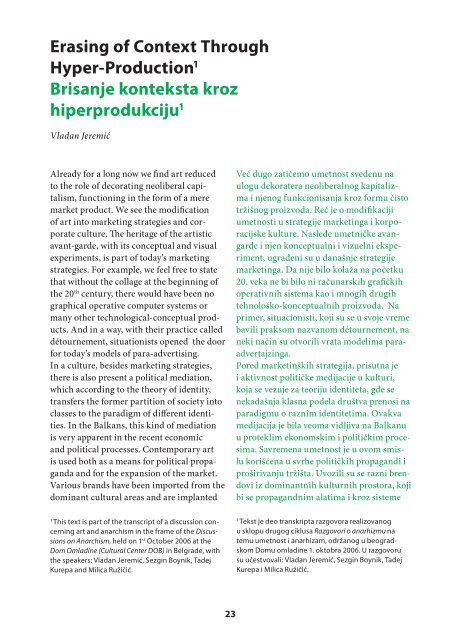You also want an ePaper? Increase the reach of your titles
YUMPU automatically turns print PDFs into web optimized ePapers that Google loves.
Erasing of Context Through<br />
Hyper-Production 1<br />
Brisanje konteksta kroz<br />
hiperprodukciju 1<br />
Vladan Jeremić<br />
Already for a long now we find art reduced<br />
to the role of decorating neoliberal capitalism,<br />
functioning in the form of a mere<br />
market product. We see the modification<br />
of art into marketing strategies and corporate<br />
culture. The heritage of the artistic<br />
avant-garde, with its conceptual and visual<br />
experiments, is part of today’s marketing<br />
strategies. For example, we feel free to state<br />
that without the collage at the beginning of<br />
the 20 th century, there would have been no<br />
graphical operative computer systems or<br />
many other technological-conceptual products.<br />
And in a way, with their practice called<br />
détournement, situationists opened the door<br />
for today’s models of para-advertising.<br />
In a culture, besides marketing strategies,<br />
there is also present a political mediation,<br />
which according to the theory of identity,<br />
transfers the former partition of society into<br />
classes to the paradigm of different identities.<br />
In the Balkans, this kind of mediation<br />
is very apparent in the recent economic<br />
and political processes. Contemporary art<br />
is used both as a means for political propaganda<br />
and for the expansion of the market.<br />
Various brands have been imported from the<br />
dominant cultural areas and are implanted<br />
1 This text is part of the transcript of a discussion concerning<br />
art and anarchism in the frame of the Discussions<br />
on Anarchism, held on 1 st October 2006 at the<br />
Dom Omladine (Cultural Center DOB) in Belgrade, with<br />
the speakers: Vladan Jeremić, Sezgin Boynik, Tadej<br />
Kurepa and Milica Ružičić.<br />
23<br />
Već dugo zatičemo umetnost svedenu na<br />
ulogu dekoratera neoliberalnog kapitalizma<br />
i njenog funkcionisanja kroz formu čisto<br />
tržišnog proizvoda. Reč je o modifikaciji<br />
umetnosti u strategije marketinga i korporacijske<br />
kulture. Nasleđe umetničke avangarde<br />
i njen konceptualni i vizuelni eksperiment,<br />
ugrađeni su u današnje strategije<br />
marketinga. Da nije bilo kolaža na početku<br />
20. veka ne bi bilo ni računarskih grafičkih<br />
operativnih sistema kao i mnogih drugih<br />
tehnološko-konceptualnih proizvoda. Na<br />
primer, situacionisti, koji su se u svoje vreme<br />
bavili praksom nazvanom détournement, na<br />
neki način su otvorili vrata modelima paraadvertajzinga.<br />
Pored marketinških strategija, prisutna je<br />
i aktivnost političke medijacije u kulturi,<br />
koja se vezuje za teoriju identiteta, gde se<br />
nekadašnja klasna podela društva prenosi na<br />
paradigmu o raznim identitetima. Ovakva<br />
medijacija je bila veoma vidljiva na Balkanu<br />
u proteklim ekonomskim i političkim procesima.<br />
Savremena umetnost je u ovom smislu<br />
korišćena u svrhe političkih propagandi i<br />
proširivanju tržišta. Uvozili su se razni brendovi<br />
iz dominantnih kulturnih prostora, koji<br />
bi se propagandnim alatima i kroz sisteme<br />
1 Tekst je deo transkripta razgovora realizovanog<br />
u sklopu drugog ciklusa Razgovori o anarhizmu na<br />
temu umetnost i anarhizam, održanog u beogradskom<br />
Domu omladine 1. oktobra 2006. U razgovoru<br />
su učestvovali: Vladan Jeremić, Sezgin Boynik, Tadej<br />
Kurepa i Milica Ružičić.


